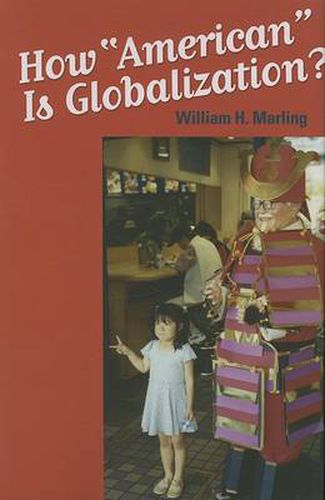Readings Newsletter
Become a Readings Member to make your shopping experience even easier.
Sign in or sign up for free!
You’re not far away from qualifying for FREE standard shipping within Australia
You’ve qualified for FREE standard shipping within Australia
The cart is loading…






William Marling’s provocative work analyzes - in specific terms - the impacts of American technology and culture on foreign societies. Marling answers his own question - how American is globalization? - with two seemingly contradictory answers: less than you think but more than you know. Deconstructing the myth of global Americanization, he argues that despite the typically American belief that the United States dominates foreign countries, the practical effects of Americanization amount to less than one might suppose. While critics point to the uneven popularity of McDonalds as a prime example of Americanization, Marling shows, in a series of case studies, that local cultures are intrinsically resilient and that local languages, eating habits, land use, education systems, and other social patterns determine the extent to which American culture is imported and adapted to native needs. He argues that local cultures can actually be accentuated by globalization, and that they often put their own imprint on what they import - from translating films and television into hundreds of languages to changing the menu at a McDonalds to include the Japanese favorite Chicken Tastuta. Marling also examines the unexpected ways in which American technology travels abroad: the technological transferability of the ATM, the practice of franchising, and shop-floor American innovations like shipping containers, bar codes, and computers. These technologies convey American attitudes about work, leisure, convenience, credit, and travel, but as Marling shows, they take root overseas in ways which are anything but American.
$9.00 standard shipping within Australia
FREE standard shipping within Australia for orders over $100.00
Express & International shipping calculated at checkout
Stock availability can be subject to change without notice. We recommend calling the shop or contacting our online team to check availability of low stock items. Please see our Shopping Online page for more details.
William Marling’s provocative work analyzes - in specific terms - the impacts of American technology and culture on foreign societies. Marling answers his own question - how American is globalization? - with two seemingly contradictory answers: less than you think but more than you know. Deconstructing the myth of global Americanization, he argues that despite the typically American belief that the United States dominates foreign countries, the practical effects of Americanization amount to less than one might suppose. While critics point to the uneven popularity of McDonalds as a prime example of Americanization, Marling shows, in a series of case studies, that local cultures are intrinsically resilient and that local languages, eating habits, land use, education systems, and other social patterns determine the extent to which American culture is imported and adapted to native needs. He argues that local cultures can actually be accentuated by globalization, and that they often put their own imprint on what they import - from translating films and television into hundreds of languages to changing the menu at a McDonalds to include the Japanese favorite Chicken Tastuta. Marling also examines the unexpected ways in which American technology travels abroad: the technological transferability of the ATM, the practice of franchising, and shop-floor American innovations like shipping containers, bar codes, and computers. These technologies convey American attitudes about work, leisure, convenience, credit, and travel, but as Marling shows, they take root overseas in ways which are anything but American.